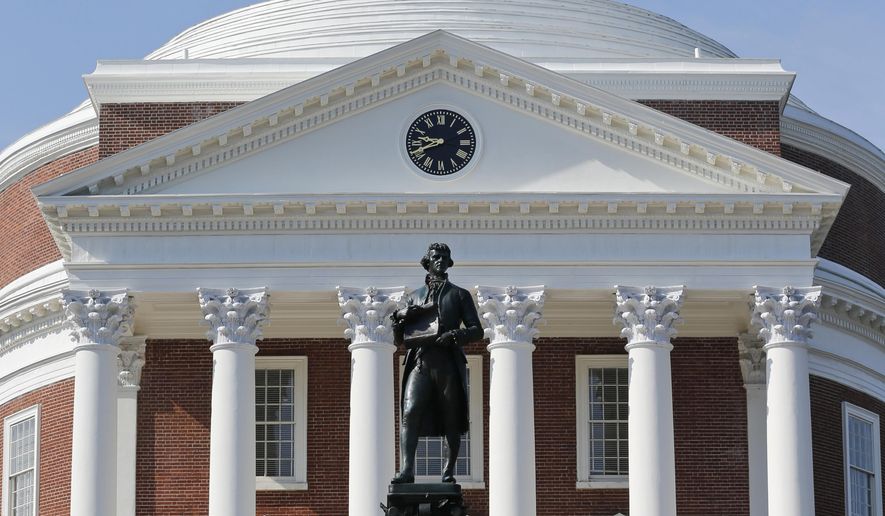OPINION:
Falls Church, Virginia, school board officials, citing slavery, just voted to remove the name of Thomas Jefferson from an elementary school, despite the fact the vast majority of citizens were opposed to the idea.
Yet another example of ignorance and radical leftism winning a cultural battle.
It’s high time — it’s past high time even — to put a stop to the historical revisionists and anti-American forces who are trying to crumble this country from within, and working feverishly to abolish all that makes this nation great.
Once again, for those in the back of the room: Yes, Thomas Jefferson owned slaves.
But to chalk him up as a rabid racist and therefore unworthy of modern day honor and esteem is to slander his name, dismiss his genius and utterly skew American history.
Jefferson, primary author of the Declaration of Independence, wrote what is perhaps the greatest and most inspiring expression of freedom the world has ever seen.
He also opposed slavery at a time when slavery was widely accepted — and did so, yes, hypocritically, while owning slaves.
As Monticello.org notes: Jefferson owned more than 600 slaves at various times in his life, directly profited from the labors of slaves and even, according to his “Notes on the State of Virginia,” dabbled with the idea that blacks were inferior to whites.
Simultaneously, he publicly opposed slavery. Simultaneously, he publicly denounced slavery.
“Calling it a ’moral depravity’ and a ’hideous blot,’ he believed that slavery presented the greatest threat to the survival of the new American nation,” Moticiello.org wrote. “Jefferson also thought that slavery was contrary to the laws of nature, which decreed that everyone had a right to personal liberty. These views were radical in a world where unfree labor was the norm.”
So why did he own slaves, then, if he was so dead-set against slavery?
That is the question, right?
And the easy answer is this: There is no good reason. There’s no justification to own slaves, no matter what the economy dictates, no matter how common the practice is, no matter how many other segments of society throughout history have engaged in slavery — even the very segments of society who were themselves enslaved.
“When the Slave Traders Were African,” one Wall Street Journal headline read from September, 2019.
The piece recounts how an “anguished debate over slavery in the U.S. is often silent on the role that Africans played.”
In other words: Slavery wasn’t always a matter of whites selling blacks. Blacks, too, profited from the enslavement of those of their own race.
That still doesn’t excuse Jefferson’s own sins of slavery — or his hypocrisies of opposing slavery while profiting from slave labor.
But it does underscore the idea that history is messy, as messy as the personalities and characters of the figures of history. And to dismiss or deny the full truths of history and history’s greats is to one day, as the logical path would lead, utterly blot out all history.
Let’s not forget Jefferson didn’t just vocalize distaste for slavery. He fought for legislation that would abolish slavery.
“In 1778, he drafted a Virginia law that prohibited the importation of enslaved Africans,” Moticello.org wrote. “In 1784, he proposed an ordinance that would ban slavery in the Northwest Territories. … Jefferson’s belief in the necessity of ending slavery never changed. From the mid-1770s until his death, he advocated the same plan of gradual emancipation” — which is to say he wanted to first, abolish the transatlantic slave trade; second, implement better working conditions for existing slaves; and third and finally, outright abolish slavery and put in effect a date by which all those born after would be declared free.
He was wrong to think improving the conditions of existing slaves was a valid path toward abolishing slavery — or even the moral path to pursue. But that’s a viewpoint that must be placed in its full historical context to be appreciated and properly analyzed.
Fact is, Jefferson is one of America’s most important historical figures.
He’s one of America’s greatest historical figures.
His contributions to the creation of a free government — his glorious language of the Declaration of Independence, his studied analysis of what makes and keeps societies free — cannot be disregarded, or even disputed.
And it’s only the knee-jerking ignorance of today’s loud-mouthed leftists who seek to deny Jefferson’s amazing contributions to American Exceptionalism — an exceptionalism that has worked for blacks as well as whites, for women as well as men, for those born into poverty as well as those born into wealth.
Tearing his name from a school doesn’t change that. It does, however, fuel the anti-America segments of society who simply want to toss out the Constitution to usher in socialism, or Marxism, or communism, or some other form of collectivism that simply goes against the founding tenets of America.
And if they succeed, they will destroy all of America’s communities, black, white, brown, yellow, what have you. All will lose cherished freedoms. The fight is for truth. On history, the Bible offers some sound advice: Let those without guilt cast the first stone.
Jefferson was human. That made him sin-filled. Just like any other human in all of human history. Just like any other human whose name will now adorn the Falls Church school — who in fact benefited from the ideals penned by Jefferson in the Declaration of Independence. Who are the hypocrites now?
• Cheryl Chumley can be reached at cchumley@washingtontimes.com or on Twitter, @ckchumley. Listen to her podcast “Bold and Blunt” by clicking HERE. And never miss her column; subscribe to her newsletter by clicking HERE.




Please read our comment policy before commenting.